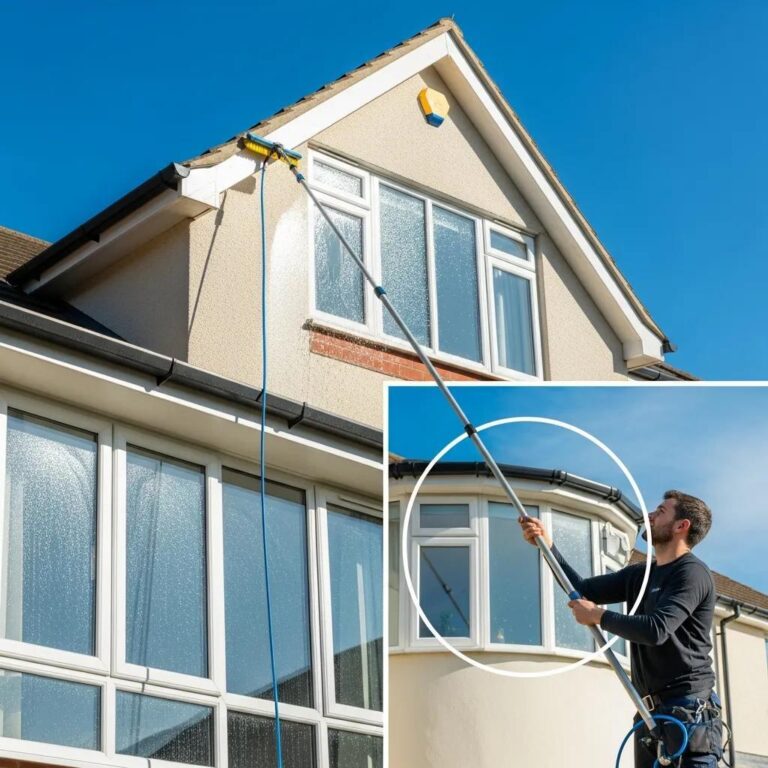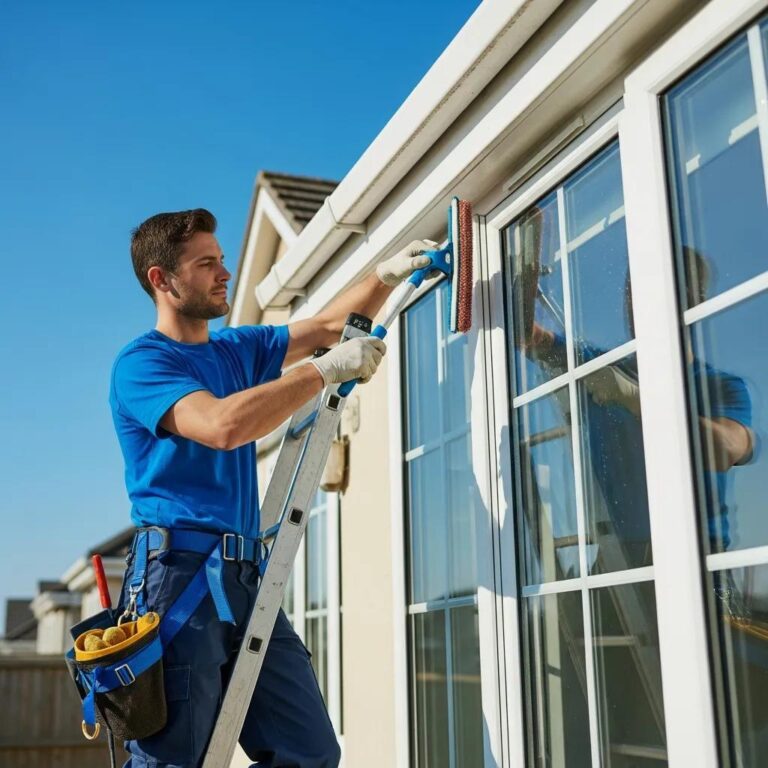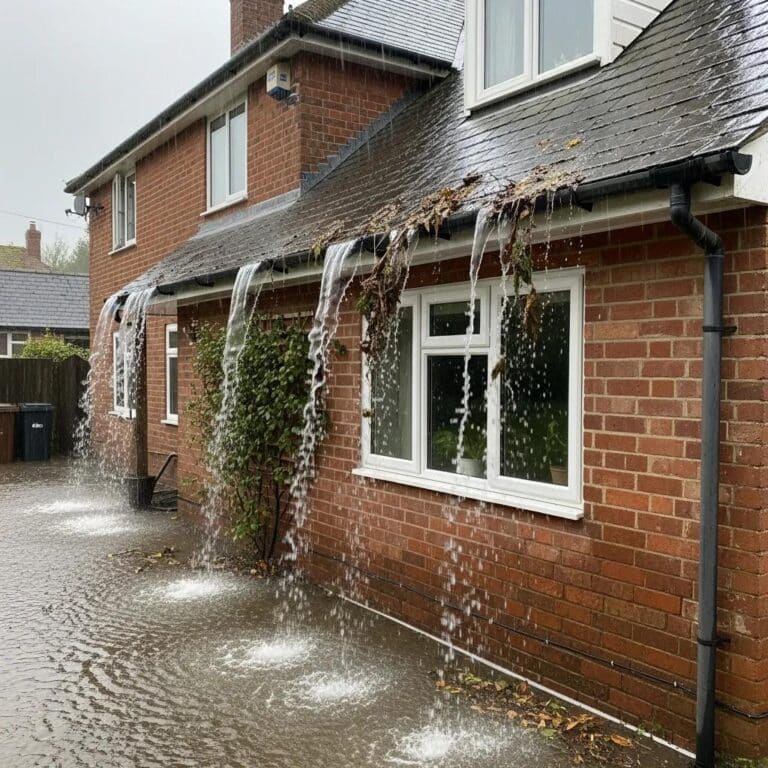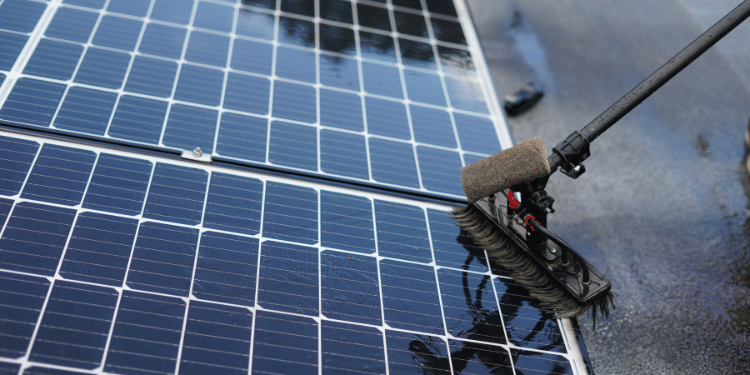Have you ever wondered why your solar panels aren’t performing as well as they used to, even on the sunniest days?
While it’s easy to assume your solar system is maintenance-free, the truth is far from it.
One of the most overlooked aspects of solar panel care is keeping them clean.
Just like a dirty windshield can block your view, a layer of grime on your solar panels can block sunlight, leading to lower energy output. Dust, debris, bird droppings, and even seasonal pollen can significantly reduce your solar panels’ efficiency and lifespan.
In this article, we’ll explain six key benefits of keeping your solar panels clean, answer common questions about natural cleaning methods like rain, and explain how often and when you should clean your panels.
We’ll also highlight why it’s best to hire professionals.
Let’s get started right away.
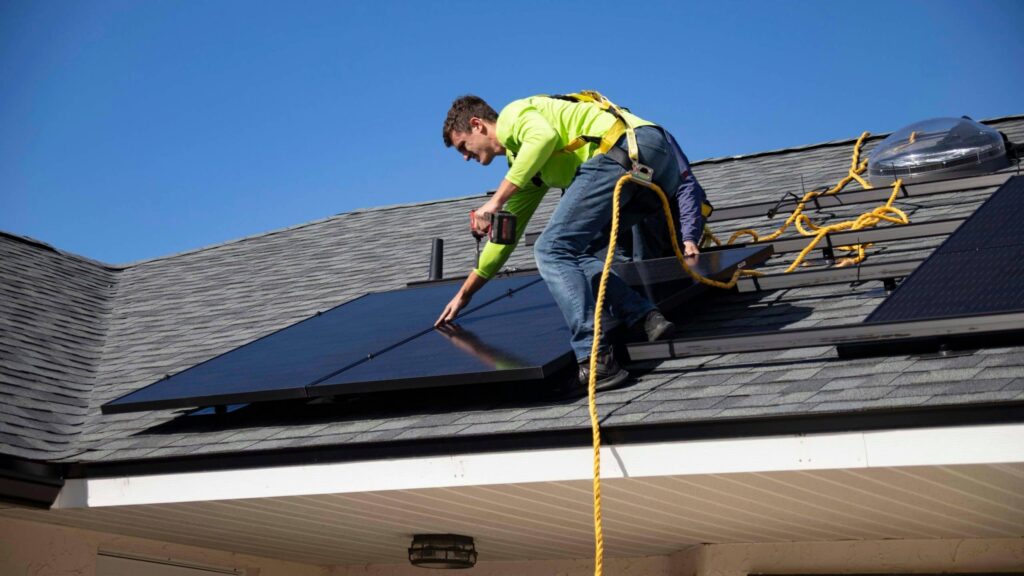
6 Benefits of Keeping Your Solar Panels Clean
Regular cleaning offers several tangible benefits beyond just better energy production.
1. Dust Isn’t Just Dirt, It’s Lost Energy
One of the most common culprits affecting solar panel efficiency is dust. You might think a thin layer of dust isn’t a big deal, but studies show it can reduce panel output by up to 20% or more, especially in dry, dusty areas.
Dust particles block sunlight from reaching the photovoltaic cells inside your panels. Since solar energy relies on direct exposure to sunlight, anything that inhibits that exposure translates into lost power.
If you live near construction zones, farmlands, or high-traffic roads, your panels are particularly susceptible. Even suburban environments aren’t exempt. That’s why cleaning off dust regularly is essential to maintaining peak performance.
2. Say Goodbye to Bird Droppings, Pollen, and Tree Sap
Unlike dust, which accumulates gradually, bird droppings can block solar cells entirely, drastically reducing performance in specific areas of your panels. Worse still, they’re acidic, potentially damaging your panels over time if left untreated.
Droppings tend to stick and don’t wash off easily with rain (more on that later). If your panels are installed near trees, poles, or other bird-perching spots, you’re at high risk. Regular cleaning ensures these acidic hazards don’t degrade your system or rob you of valuable energy production.
Pollen can layer up and reduce efficiency, especially in spring. Tree sap is worse; it is sticky, opaque, and difficult to remove without damaging the glass. Over time, it can etch the surface or attract more dirt and insects.
3. Cut Costs Over Time with Regular Cleaning
While it might seem like an additional cost, regular solar panel cleaning saves money in the long run. Increased efficiency means lower energy bills, and a longer panel life means fewer replacements or repairs.
Additionally, routine cleaning allows for early detection of issues such as cracks, loose wiring, or pest nests, helping you prevent costly repairs before they escalate. Over time, this proactive approach pays for itself, especially when done by professionals who know what to look for.
4. Improve the Aesthetics of Your Building
Clean solar panels don’t just function better, they look better too. For homes and businesses alike, aesthetics matter. Dirty, streaked, or bird-stained panels can ruin the visual appeal of your property, especially when installed on prominent rooftops or visible areas.
Whether you’re a homeowner taking pride in your property’s appearance or a business looking to make a strong, eco-conscious impression, maintaining spotless panels contributes positively to your image.
5. Extend the Life of Your Solar Investment
Solar panels are a long-term investment, often expected to last 25 years or more. But like any investment, they require upkeep. Dirt, bird waste, pollen, salt spray, and urban grime can degrade the surface of your panels over time, especially if they’re not cleaned off regularly.
When contaminants sit too long, they can cause micro-scratches, corrosion, or sealant breakdown, leading to permanent damage. By keeping your panels clean, you’re not just improving performance; you’re also preserving their condition and extending their usable life.
6. Boost Your Solar Panel Efficiency
Clean panels are efficient panels. Regular maintenance can restore and even boost the power output of your solar energy system. Some studies suggest that panels that are cleaned regularly can generate up to 30% more energy than those left unattended.
Can Rain Clean My Solar Panels?
It’s a common belief that rainwater naturally cleans solar panels. However, while rain can help rinse off loose dust, it’s not enough to thoroughly clean panels, especially when it comes to sticky substances like pollen, pollution, sap, or bird droppings.
Think of it like your car windshield. Rain may wash off some dirt, but it also leaves streaks and doesn’t remove built-up grime. Rain can sometimes make things worse by spreading dirt into streaks or creating water spots that block light.
For proper cleaning, you need more than just rain; you need a targeted cleaning process that removes residue without scratching the panels. That’s where professional services come in, using purified water and solar-safe equipment.
How Often Should I Clean My Solar Panels?
The recommended cleaning frequency depends on a few factors:
- Location: Panels in dusty, industrial, or coastal areas may need cleaning every 3-4 months
- Surroundings: If you have overhanging trees or frequent bird activity, you may need cleaning bi-monthly or quarterly
- Climate: Dry, arid climates typically require more frequent cleaning than areas with regular rainfall
- Type of installation: Ground-mounted systems are easier to inspect and may be cleaned more often
As a general rule, cleaning every six months is a good benchmark for most homeowners, with quarterly cleaning recommended for commercial systems or dirt-prone regions.
What’s the Best Time to Clean My Solar Panels?
The ideal time to clean your solar panels is early in the morning or late in the afternoon, when the panels are cool. Cleaning during midday or when the sun is directly overhead can cause water to evaporate quickly, leaving streaks and water spots.
Cooler temperatures also prevent thermal shock, which can occur if cold water contacts a hot panel surface. Early morning also has the added benefit of softened grime due to overnight dew, making it easier to clean.
For seasonal scheduling, spring and fall are ideal times to clean, after pollen season and before winter grime sets in. However, in especially dusty or polluted environments, cleaning should occur more frequently throughout the year.
Why Clean Solar Panels Matter for Efficiency, Longevity & Cost SavingsConclusion
Keeping your solar panels clean is not just about aesthetics; it’s about efficiency, longevity, and cost-effectiveness. Regular cleaning ensures you avoid expensive repairs or early replacements.
While some homeowners might attempt DIY cleaning, it’s not always safe or effective, especially for rooftop systems. Using the wrong tools or cleaning at the wrong time can lead to scratches, damage, or even personal injury.
That’s why it’s best to hire solar panel cleaning professionals like ClearView Services.
ClearView Services specializes in residential and commercial solar panel cleaning in Medway and Maidstone using industry-safe techniques and purified water systems that won’t leave mineral deposits or damage your panels.
Ready to get the most out of your solar investment? Contact ClearView Services today to schedule a professional solar panel cleaning.
FAQs
1. Can cleaning my solar panels void the warranty?
Yes, it can if done improperly. Most solar panel manufacturers include cleaning clauses in their warranty agreements. Using abrasive materials, harsh chemicals, or unapproved tools could void the warranty. That’s why hiring certified professionals is essential, as they clean according to manufacturer guidelines.
2. What kind of water should be used to clean solar panels?
Deionized or purified water is best. Tap water may contain minerals that leave residue or streaks. Professional cleaners use specialized water-fed poles and filtration systems to avoid mineral deposits, which can cloud the panel surface.
3. Can I use a pressure washer to clean my solar panels?
No. High-pressure washers can crack or dislodge the glass surface, wiring, or mounting brackets. Most manufacturers strictly advise against it. Always use soft brushes and low-pressure, filtered water.
4. How do I know if my solar panels need cleaning if I can’t see them?
If your system has monitoring capabilities, watch for drops in output not linked to weather changes. A sudden or gradual performance dip often signals dirt buildup. Alternatively, schedule periodic inspections.
5. Is cleaning needed if I have a solar tracking system?
Yes. While solar tracking helps maximize exposure to sunlight, it doesn’t prevent dirt from collecting. Since these systems rotate, they may pick up more dust or debris depending on the terrain or wind patterns.
6. Can cleaning solar panels help diagnose other system issues?
Yes. During cleaning, professionals often spot issues like loose wiring, damaged inverters, or signs of pests like squirrels or birds nesting. Regular cleaning acts as both maintenance and inspection, helping you avoid unexpected failures.

